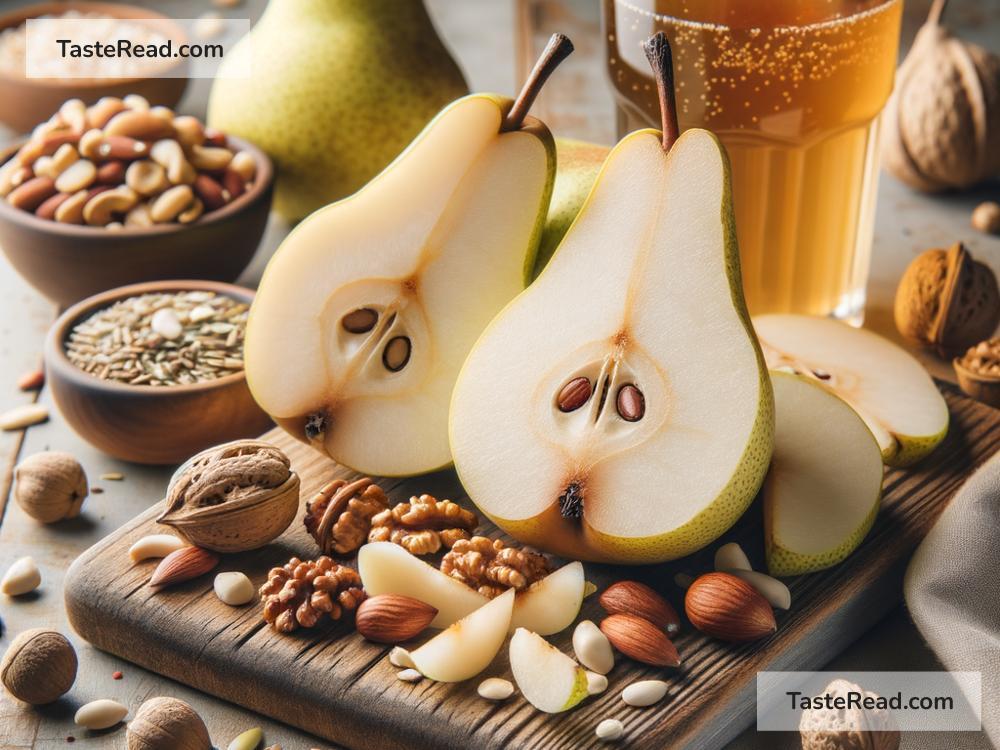Can Pears Improve Gut Health?
Gut health is a hot topic these days. More people are realizing that their digestive system plays a key role in overall health, affecting everything from energy levels to mood. While we often hear about probiotics, yogurt, and fiber as ways to promote a healthy gut, did you know that one humble fruit may also have gut-friendly benefits? That fruit is the pear!
In this article, we’ll explore how pears can improve your gut health, along with some tips on adding them to your diet.
What Makes Gut Health Important?
Before we dive into pears, let’s talk about why gut health matters. Your gut, or digestive system, is home to trillions of bacteria, collectively known as the gut microbiome. These bacteria play a major role in digestion, nutrient absorption, immune system support, and even mental health. A healthy gut microbiome contributes to overall well-being, while an unbalanced gut can lead to problems like constipation, bloating, and inflammation.
One of the easiest ways to nurture your gut is through your diet. Eating foods high in fiber and natural nutrients can create a healthy environment for your gut bacteria to thrive. This is where pears come in!
Why Are Pears Good for Your Gut?
Pears are more than just a sweet and juicy snack. They are packed with fiber, vitamins, and plant compounds that make them a great choice for gut health. Here’s why:
1. Rich in Fiber
Pears are one of the best natural sources of dietary fiber. A medium-sized pear contains about 6 grams of fiber, which is more than 20% of your daily recommended intake. Fiber is essential for digestion because it helps move food through your digestive tract and prevents constipation.
There are two types of fiber: soluble and insoluble. Pears contain both! Soluble fiber dissolves in water and forms a gel-like substance in your gut, which can help feed healthy gut bacteria. Insoluble fiber, on the other hand, adds bulk to your stool and ensures regular bowel movements. Together, these fibers work wonders for your gut.
2. Prebiotic Effects
Certain compounds in pears act as prebiotics, which means they feed the good bacteria in your gut. When your gut bacteria are happy and well-fed, they multiply and create a balanced microbiome. A diverse and balanced microbiome can improve digestion, reduce inflammation, and even enhance your immune system.
One type of prebiotic fiber found in pears is called pectin. Pectin helps increase the production of short-chain fatty acids in your gut, which have been linked to better gut health and reduced risk of colon issues.
3. Gentle on the Digestive System
Unlike some fruits, pears are gentle on the stomach. They’re less acidic than citrus fruits like oranges and lemons, making them easier for people with sensitive stomachs to digest. Pears are also low in FODMAPs (fermentable sugars that can cause digestive discomfort), which makes them a safe option for people with irritable bowel syndrome (IBS).
4. Hydration Boost
Pears contain about 84% water, which can help keep your digestive system hydrated. Water plays a key role in digestion, as it helps fiber do its job and keeps things moving smoothly in your intestines. Eating pears is not only refreshing but also a natural way to stay hydrated and support digestion.
5. Packed with Nutrients
Pears are rich in vitamins and antioxidants like vitamin C and K, as well as potassium. These nutrients help reduce inflammation in the gut and support the general health of the digestive lining.
How to Add Pears to Your Diet
Adding pears to your diet is easy, and there are many delicious ways to enjoy them. Here are a few ideas:
-
Eat Them Fresh: The simplest way to enjoy pears is to eat them fresh and ripe. Just wash them, slice them, and enjoy! You can eat the skin too, as it’s a big source of fiber.
-
Blend into Smoothies: Pears blend beautifully into smoothies. Combine them with yogurt, spinach, and a banana for a gut-friendly drink.
-
Bake or Roast: Baking pears with a sprinkle of cinnamon is a warm and tasty treat. Roasted pears can also be added to salads for a sweet twist.
-
Add to Oatmeal: Sliced pears make a wonderful topping for oatmeal. Their natural sweetness means you won’t need added sugar.
-
Pair with Cheese: Balancing the sweetness of pears with a tangy or salty cheese (like goat cheese) creates a delicious snack or appetizer.
Things to Keep in Mind
While pears are incredibly healthy, eating them in moderation is key. Too much fiber can sometimes lead to bloating or gas, especially if your body isn’t used to high-fiber foods. Start with one pear a day and increase gradually.
Also, for maximum benefits, eat pears with their skin on. The skin is where much of the fiber and nutrients are concentrated.
Conclusion
The next time you’re at the grocery store, don’t overlook the pear! Its high fiber content, prebiotic properties, and gentle digestion benefits make it a fantastic fruit for gut health. Plus, pears are versatile, delicious, and easy to include in your daily meals.
Making pears a regular part of your diet may not only satisfy your taste buds but also keep your gut happy and thriving. So grab a pear, snack away, and give your gut the love it deserves!


